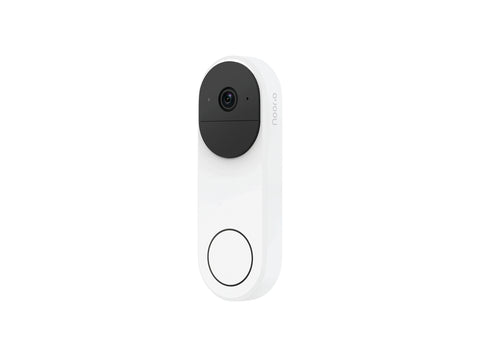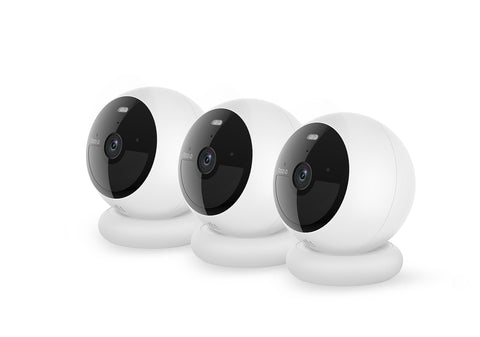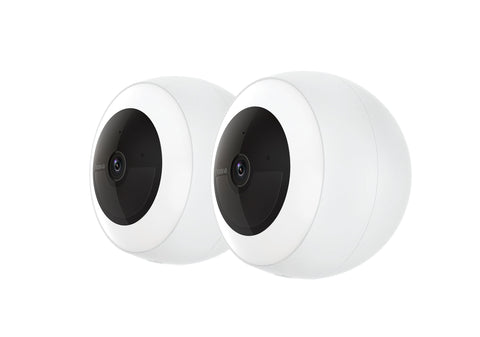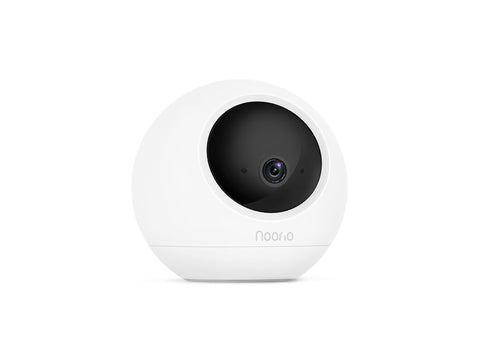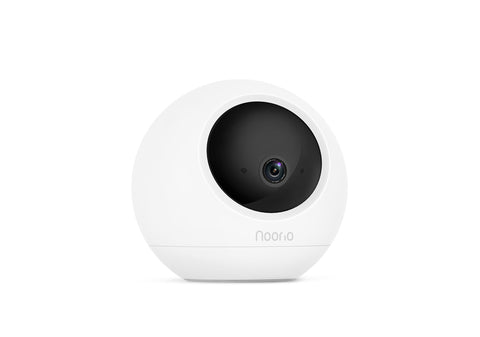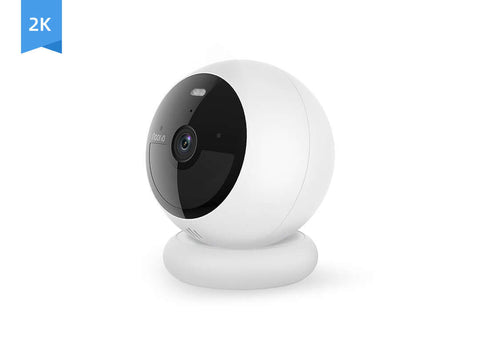Owning an RV, motorhome, or travel trailer allows you to embark on exciting adventures and explore the world. However, installing the right security cameras is key to protecting your investment on the road, especially when you're on the road or parked in unfamiliar locations. The best security cameras and systems designed specifically for RVs offer peace of mind, enabling you to keep a watchful eye on your vehicle and belongings.
In this article, we will explore the top security camera options for RVs, motorhomes, and travel trailers to help you make an informed decision.
I. Types of Security Threats Facing RVs, Motorhomes & Travel Trailers
There are basically three main security threats as follows:
- Vandalism - RVs parked in campgrounds or storage lots are vulnerable to damage from trespassers. Security cameras deter vandalism and catch perpetrators.
- Theft - Valuables like tools and electronics are tempting targets for thieves. Cameras provide video evidence to aid in prosecuting thieves.
-
Privacy concerns - RVs have windows everywhere. Cameras let you monitor the outside to prevent peeping or intrusions when staying in remote areas.

II. Factors to Consider When Choosing RV Security Cameras
After understanding the security threats, learn about the factors to consider when choosing a security camera:
1. Camera Type: Wired vs Wireless Cameras
Wired cameras have reliable connectivity but require running cables, which can be difficult in an RV. Wired cameras are best for permanent installation in motorhomes or travel trailers.
Wireless cameras are much simpler to install but rely on WiFi or cellular signals that may be spotty on the road. Battery-powered wireless cameras can move easily between vehicles. Most are recommended for vans and truck campers.
2. Power Source: Battery-Powered vs Hardwired
Battery-powered cameras have flexibility but need recharging. Look for longer battery life and optional solar charging.
Hardwired cameras have reliable power but require installation near an electrical source. Consider your needs when boondocking off-grid.
3. Connectivity: Cellular vs WiFi
Cellular cameras allow viewing from anywhere via mobile network. Consider data limits and costs of subscriptions.
WiFi cameras only work within range of your RV's hotspot. An included SD card slot ensures local video storage.
4. Camera Resolution and Field of View
1080p resolution provides clarity while 4K offers more detail. A wide-angle lens blankets more area but sacrifices sharpness, while a narrow field of view focuses tightly on one area. Consider your needs.
5. Night Vision Capability
Infrared night vision captures black and white footage in darkness, while starlight technology enhances color in low light. Check the night vision range for your situation.
III. Installation and Setup Tips
Some tips that help you fine a better installation spot and make a good setup:
1. Camera Placement Strategies
Mount outside cameras high and hidden to discourage vandalism. For inside cameras, respect tenants' privacy laws. Adhesive mounts allow repositioning as needed.
2. Remote Access and Alert Features
Look for apps providing real-time mobile access from anywhere along with motion and sound-activated alerts by text and notifications. Test range and reliability before relying on them completely.
3. Integration with Smart Home Devices
Some cameras integrate with smart displays for live streaming. Some even let lights or alarms activate via automation if motion is detected. Consider your existing setup.
IV. Maximizing Security and Efficiency
Achieving security and efficiency requires balancing maintenance and video footage.1. Ongoing Camera Maintenance
Clean lenses regularly to ensure clear video. Check that firmware and apps are updated for latest features and security fixes. Test recording and access annually.
2. Storage Options for Video Footage
Many cameras offer cloud storage with monthly fees, while others save clips locally on an SD card. SD cards have initial cost but no subscriptions.
2.1 Battery Life Tips
Limit recording length between charges to extend battery lifespan. Use power-saving night mode if available. Consider adding solar panels.
2.2 Subscription Plans
Weigh value of professional monitoring services against basic do-it-yourself monitoring with camera storage only.

V. Choose the Best Security Cameras for Your RV
As the popularity of RV travel continues to grow, so too does the need for protecting these valuable mobile investments. RVs, motorhomes, travel trailers and other recreational vehicles represent tens of thousands of dollars in property, and just like homes, are vulnerable to theft and vandalism when left unattended. Installation of an RV security camera system provides peace of mind by deterring criminal activity and aiding law enforcement should any issues arise. This guide will help you determine the right cameras and setup for maximizing security on your travels.
Understanding Vehicle Crime Statistics
Though rare relative to other property types, reports of criminal incidents involving RVs are on the rise. The National Insurance Crime Bureau estimated over 1 million vehicles were reported stolen in 2022, a number that likely only accounts for a fraction of total thefts. Popular storage lots and campgrounds unfortunately see regular crimes like:
- Vandalism and graffiti - According to a 2021 study by the RV Industry Association, nearly 60% of RV owners reported experiencing some kind of vandalism or theft incident over the lifetime of their vehicle.
- Theft of valuable equipment - GPS units, bikes, laptops and other gear left outside are frequently taken.
- Interior ransacking - Thieves opening compartments searching for wallets, electronics and other small items not in plain view.
- Tampering with systems - Incidents of cut wires, drained batteries or disconnected hoses intended to cause costly repairs.
VI. Camera Types and Their Uses
When selecting cameras, consider your specific RV set up and storage locations. The right mix of wired and wireless options gives full protection inside and out.
Wired Cameras Connect using PoE (Power over Ethernet) for continuous power. Best suited for Class A motorhome interiors with permanent installations. Easy to hide wires in walls/ceilings.
Wireless Cameras Convenient for irregular use areas without building wire runs. Types include:
- Battery-powered - Flexible placement but require recharging. Work well for truck campers and tagging along vehicles.
- Cellular/LTE - View remotely anywhere but have recurring data costs. Best choice for long-term storage areas.
- WiFi - Connect to your RV's hotspot when parked but have limited range away.
Mixing both wired and wireless options provides versatile coverage inside and out with minimal hassle. Choosing brands with compatible ecosystems allows expanding the system over time.
V. Components to Consider
Beyond connectivity, other factors impact camera selection and performance:
- Resolution - Higher resolutions like 4K produce sharper footage important for identification.
- Night vision - LED infrared for black/white or "starlight" CMOS sensors enabling color night footage up to 30ft.
- Field of view - Wide-angle best for exterior/interior full coverage, narrow for detail shots of high-risk zones.
- Storage - Cloud saves continuously but may be costly. In the long-term, local SD/HDD as backup when no connectivity.
- Voice control - Speak commands through smart displays like Echo Show for live views and playback.
- Weatherproofing - Minimum rating of IP65 to endure all climates inside and out.
The Products that we have:
- Resolution - Noorio cameras like the B210 Pro offer 2K ultra-clear footage for capturing crisp details to identify intruders.
-
Night vision - The B200 and B210 feature both color and black/white night vision up to 30 feet, providing crystal clear monitoring even in total darkness.
- Field of view - The wide 130-degree angle of Noorio cameras allows expansive interior/exterior coverage without missing a moment. Narrower fields of view are also available.
- Storage - Noorio B200 and B210 offer up to 16GB onboard storage to record footage locally at no additional cost. Purchase the Smart Hub for continuous cloud backups ensuring protection when offline.
- Voice control - The Noorio security system is compatible with Alexa and Google Home for live views, playback and more using just voice commands on smart displays and speakers.
- Weatherproofing - All Noorio outdoor cameras like the B310 are IP66 weatherproof rated to withstand rain, snow, heat and cold for enduring outdoor surveillance.
With the right balance of these components, a tailored camera system provides appropriate security wherever an RV may roam.

VI. Installation and Usage Tips
Correct placement utilizes cameras to their full potential. Some best practices:
- Mount exterior cameras high, hidden and angled to capture license plates. Discourage vandalism.
- Interior cameras discreetly track activity without invading privacy. Adhesive mounts allow repositioning.
- Driveways and carports require cameras viewing side/rear entry points thieves exploit.
- Test motion alerts, night vision and streaming quality before relying fully for off-grid security.
- Enlist an RV-specific technician for motorhome hardwire installations versus DIY cable runs.
- Regular maintenance like cleaning lenses maximizes video forensic value should an incident occur.
- Demonstrate active use and monitoring with occasional false motion tests to warn off scoped-out targets.
With mindful installation ROI increases exponentially from an initially small camera investment.
VII. Protect Your Travels
Stories from full-time RVers highlight peace of mind that comes with vigilant camera monitoring. One family shared:
"After finding tools of our generator mysteriously drained one morning, we installed cameras inside and out. A few months later strange noises woke us at 3am - the cameras caught a hooded person lurking outside. We were able to scare them off, saving ourselves potential repair costs or worse thanks to being aware."
For RVers attempting to safeguard tens of thousands in property while pursuing travel dreams, the right camera setup offers invaluable insurance. Proper research leads to maximized security wherever adventures may roam. Stay safe and happy travels!
VIII. RV Security Camera FAQs
-
Q: Can I use security cameras while driving my RV?
A: It's not recommended to use security cameras while driving as they may distract the driver. Use cameras for surveillance only when the vehicle is parked or stationary. -
Q: How do battery-powered cameras conserve power in an RV?
A: Battery-powered cameras use motion detection and power-saving modes to conserve energy and extend battery life. -
Q: Can I access camera footage when my RV is parked in a remote area without WiFi or cellular coverage?
A: Yes, some cameras offer local storage options like SD cards, allowing you to access footage even without internet connectivity. -
Q: Are security cameras weatherproof for outdoor use?
A: Yes, many security cameras designed for RVs are weatherproof and can withstand various environmental conditions. -
Q: How do I choose the best security camera for my specific RV model?
A: Consider the size of your RV, desired features, and budget when selecting a security camera system. Read reviews and seek expert advice if needed. -
Q: What about extreme temperatures?
A: Most operate from -4°F to 122°F. -
Q: How much storage space do cameras provide?
A: Storage varies, but quality brands offer free basic cloud storage with options to upgrade. -
Q: How do I know cameras won't get hacked?
A: Choose brands with encryption and look for recent security audits. Regular firmware updates also patch vulnerabilities.
In conclusion, RV security cameras provide peace of mind while on the road. Do your research to choose options tailored to your vehicle and needs. Proper placement and use of all features helps protect your investment and valuble memories made exploring in your RV or motorhome. Stay safe and happy travels!
